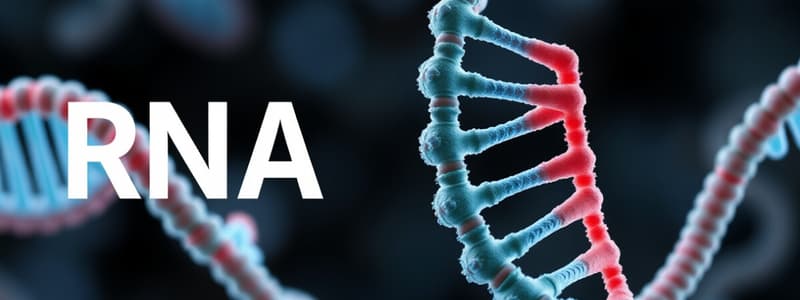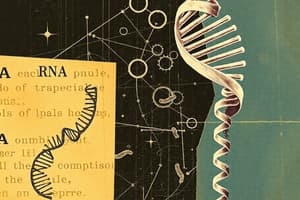Podcast
Questions and Answers
What is the process by which the genetic code of DNA is copied into a strand of RNA called?
What is the process by which the genetic code of DNA is copied into a strand of RNA called?
Transcription
How does RNA differ from DNA?
How does RNA differ from DNA?
- RNA is single stranded and DNA is double stranded. (correct)
- RNA has deoxyribose and DNA has ribose.
- RNA has uracil as a nucleotide and DNA has thymine. (correct)
- All of the above.
What does each codon in messenger RNA specify?
What does each codon in messenger RNA specify?
Amino acid
How many codons are in the genetic code?
How many codons are in the genetic code?
Why are there more codons than amino acids?
Why are there more codons than amino acids?
What is the process of making proteins on the ribosome, based on instructions from messenger RNA, called?
What is the process of making proteins on the ribosome, based on instructions from messenger RNA, called?
How many types of RNA are there?
How many types of RNA are there?
Which type of RNA functions as a blueprint for DNA?
Which type of RNA functions as a blueprint for DNA?
What is each nucleotide triplet in mRNA that specifies a particular amino acid called?
What is each nucleotide triplet in mRNA that specifies a particular amino acid called?
How many nucleotides are needed to specify three amino acids?
How many nucleotides are needed to specify three amino acids?
What is the first step in the process of protein synthesis?
What is the first step in the process of protein synthesis?
The two types of nucleic acids are?
The two types of nucleic acids are?
What sugar does RNA contain?
What sugar does RNA contain?
According to the Genetic Code Sheet, which of the following amino acid sequences corresponds to this mRNA strand? CUC AAG UGC UUC
According to the Genetic Code Sheet, which of the following amino acid sequences corresponds to this mRNA strand? CUC AAG UGC UUC
Which substances are in both DNA and RNA?
Which substances are in both DNA and RNA?
During eukaryotic transcription, the molecule that is formed is?
During eukaryotic transcription, the molecule that is formed is?
During translation, the type of amino acid that is added to the growing polypeptide depends on the?
During translation, the type of amino acid that is added to the growing polypeptide depends on the?
What do genes contain instructions for assembling?
What do genes contain instructions for assembling?
What happens to information on a chromosome undergoing a deletion mutation?
What happens to information on a chromosome undergoing a deletion mutation?
What is the effect of most mutations?
What is the effect of most mutations?
What is a mutation called that involves one or a few nucleotides?
What is a mutation called that involves one or a few nucleotides?
What is a chromosomal mutation?
What is a chromosomal mutation?
What is a promoter?
What is a promoter?
What is the difference between a gene mutation and a chromosomal mutation?
What is the difference between a gene mutation and a chromosomal mutation?
What is the correct sequence of the transfer of information in most organisms?
What is the correct sequence of the transfer of information in most organisms?
What are some characteristics of polyploidy plants?
What are some characteristics of polyploidy plants?
Why aren't all genes in a cell transcribed all of the time?
Why aren't all genes in a cell transcribed all of the time?
The TATA box does regulate gene expression.
The TATA box does regulate gene expression.
What does cell specialization in eukaryotic cells require?
What does cell specialization in eukaryotic cells require?
What are the three types of point mutation?
What are the three types of point mutation?
What do chromosomal mutations include?
What do chromosomal mutations include?
What is the result if an adenine nucleotide is deleted from a nucleotide sequence in a DNA molecule?
What is the result if an adenine nucleotide is deleted from a nucleotide sequence in a DNA molecule?
A transcription unit that is 8000 nucleotides long may use 1200 nucleotides to make a protein consisting of approximately 400 amino acids. How is this best explained?
A transcription unit that is 8000 nucleotides long may use 1200 nucleotides to make a protein consisting of approximately 400 amino acids. How is this best explained?
A particular triplet of bases in the coding sequence of DNA is AAA. What is the anticodon on the tRNA that binds mRNA codon?
A particular triplet of bases in the coding sequence of DNA is AAA. What is the anticodon on the tRNA that binds mRNA codon?
What could cause a frameshift mutation?
What could cause a frameshift mutation?
Why might a point mutation in DNA make a difference in the level of a protein's activity?
Why might a point mutation in DNA make a difference in the level of a protein's activity?
What does a chain of polypeptides form?
What does a chain of polypeptides form?
Study Notes
Transcription and Translation
- Transcription is the process of copying genetic code from DNA to RNA.
- Translation refers to the synthesis of proteins at ribosomes, guided by mRNA instructions.
RNA vs. DNA
- RNA is single-stranded; DNA is double-stranded.
- RNA contains ribose sugar; DNA consists of deoxyribose (one less oxygen).
- RNA uses uracil as a nucleotide while DNA uses thymine.
Codons and Amino Acids
- A codon is a triplet nucleotide sequence in mRNA that designates a specific amino acid.
- There are a total of 64 codons in the genetic code.
- The redundancy in the genetic code allows multiple codons to specify the same amino acid.
Protein Synthesis
- Eukaryotic transcription occurs in the nucleus, producing mRNA.
- Information flows in the sequence: DNA → RNA → Protein.
- During translation, tRNA's anticodons pair with mRNA's codons to add the corresponding amino acids.
Mutations
- Mutations can be point mutations (affecting one or few nucleotides) or chromosomal mutations (like translocation, duplication, inversion, and deletion).
- Deletion mutations result in loss of genetic information.
- Most mutations have no significant effect on the organism.
Gene Regulation
- Only certain genes are transcribed to save energy and resources, emphasizing the importance of gene regulation in cellular specialization.
- The TATA box is not a regulator of gene expression; it's part of initiation for transcription machinery.
Polyploidy in Plants
- Polyploidy results in plants that tend to be larger and sturdier than their diploid counterparts.
Information Encoding and Encoding Units
- A transcription unit may have noncoding sections, accounting for longer mRNA sequences than those required for protein synthesis.
- Anticodon pairing is critical in ensuring the correct amino acid sequence.
- Mutations such as insertions or deletions can lead to frameshift mutations, altering the reading frame during protein synthesis.
Protein Formation
- Chains of amino acids linked together form polypeptides, which then fold into functional proteins.
Studying That Suits You
Use AI to generate personalized quizzes and flashcards to suit your learning preferences.
Description
Test your knowledge of key concepts from Biology Chapter 13 with these flashcards. This chapter covers essential processes such as transcription and the differences between RNA and DNA. Perfect for reviewing before exams or enhancing your understanding of molecular biology.




